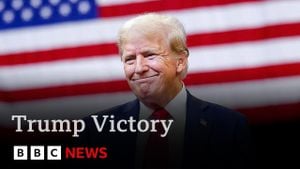The Australian political arena is buzzing with discussions around electoral reforms, set against the backdrop of the country’s changing political dynamics and the rise of independents and minor parties. This proposed legislation, widely regarded as the most significant electoral reform since the Hawke government’s modernization efforts over four decades ago, faces both support and criticism from various political factions.
On November 19, 2024, the Albanese government introduced its Electoral Legislation Amendment (Electoral Reform) Bill, which aims to revamp campaign finance laws. Special Minister of State Don Farrell heralded it as "comprehensive" and stressed its importance for transparency and accountability within the electoral system – goals widely recognized as necessary for preserving democracy. Among the bill's key provisions are the establishment of donation caps ($20,000 per donor), spending limits for political campaigns ($90 million for federal elections), and new requirements for timely disclosure of financial contributions.
Despite these efforts, critiques from independents and minor party representatives are shining through, highlighting major shortcomings. Critics argue systemic loopholes within the reform allow wealthy donors to exert influence over political outcomes. Notably, the proposed thresholds for donations have raised eyebrows; the cap of $20,000 for federal elections is substantially higher than similar measures at the state level, such as Victoria's $1,250 limit.
This disparity reveals the potential for rich donors to bypass purported restrictions, effectively creating avenues for undue influence. Analysts point out the opportunity for significant sums to flow toward major parties through affiliated entities and state branches, ensuring the political funding structure favors established organizations over newcomers or independent candidates.
Joseph W. Lyu, director of the Australian Democracy Network, indicated deep concern over the bill’s provisions, stating, “The measures could effectively entrench the status quo of major parties, widening the gap between them and independents.” The changes, they argue, not only fail to tackle the issue of big money infiltrations but also risk exacerbation of existing inequities within party funding.
Adding complexity to the debate, the Coalition has expressed cautious support for the bill but has reserved its final position, emphasizing the need for amendments. Party leader Peter Dutton acknowledged discussions had occurred with Prime Minister Anthony Albanese but suggested any agreement reached would be made public only when finalized.
Questions around timing and procedural fairness loomed large as numerous advocacy groups called for comprehensive scrutiny of the bill before it moves forward. The Centre for Public Integrity and the Australia Institute have led the charge, urging lawmakers to address major concerns, particularly about the ownership of electoral processes which they believe might serve the interests of major parties alone.
Parliament's reluctance to pursue thorough examination reflects broader apprehensions about undermining independent scrutiny for electoral reforms. Critics argue this lack of oversight may draw the ire of citizens increasingly skeptical of traditional political engagements. The 2022 Australian Election Study indicates diminishing faith in political institutions, with only 12% of respondents believing the government serves the interests of the general populace.
This growing disenchantment significantly impacts major parties, now acutely aware of rising challenges from the Teal independents and minor parties, which have amassed increased electoral support over the past few election cycles. The ACT, historically resistant to such trends, recorded 33% of its votes for independents or minor parties during the latest election, underlining a shifting electorate.
Dissenting voices within the Coalition, including independent senator David Pocock, amplified accusations of collusion between major parties to insulate themselves from rising independent candidates. “It’s clear we’re doing this to preserve power for the coalition of incumbents,” Pocock stressed, pointing out the democratic deficits these impending changes may usher.
Labor backs its bill as necessary for curtailing the influence of high-stakes donors, as echoed by Don Farrell. He characterized the legislation as pivotal for ordinary Australians seeking unbiased representation devoid of the corruptive influences of excessive monetary donations. Yet, the cap on donations sets the stage for potentially circumvented regulations – creating mechanisms for the politically wealthy to still play significant roles within the funding of major parties.
Constitutional experts have flagged vulnerabilities within the proposed legislation. Given past High Court rulings, the apparent favoritism toward established parties and their incumbents could misalign with Australia’s commitment to equitable representation. Some suggest these patterns mirror electoral frameworks seen within the U.S., often criticized for allowing overwhelming material influence to shape democratic processes.
Experts caution the level of scrutiny the bill is subjected to now will play key roles later, especially when challenges arise. The document encompassing the bill runs over 200 pages, increasingly criticized for its complex proposals, which almost no lawmaker could comprehensively understand before voting.
Critics will be watching closely as discussions proceed – could these reforms genuinely act as safeguards for Australia’s electoral future, or might they evolve as instruments for deepening the grip of the major parties on the political process? The battle is set not just on the legislative floor but, perhaps more critically, within the perceptions of voters, whose faith in government institutions teeters precariously amid these contentious discussions.
The Albanese government aims for the bill to pass by Christmas, and if successful, reforms would take effect by mid-2026. While both major parties express optimism, independent candidates and minor parties alike remain vigilant. Their voices, stakeholders argue, are just as pivotal for diversifying political representation as the major parties attempt to redefine their narratives amid challenges of dwindling voter trust.
At its heart, the argument against Labor’s electoral reforms finds its roots not merely within party politics, but within public perception and the health of Australian democracy. Will this be perceived as reform, or just cosmetic adjustments to suit the political elite? It remains to be seen, but one thing is clear – scrutiny and participation by the electorate are more important now than ever if democracy is to flourish.



